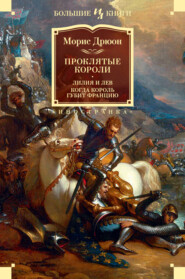По всем вопросам обращайтесь на: info@litportal.ru
(©) 2003-2025.
✖
The She-Wolf
Автор
Год написания книги
2019
Настройки чтения
Размер шрифта
Высота строк
Поля
The elder Mortimer drew his nephew to him by the sleeve, and traced the sign of the Cross on his forehead with his thumb.
‘Avenge us, Roger,’ he murmured.
Roger Mortimer bowed his head and left the dungeon.
‘Which way do we go?’ he asked.
‘By the kitchens,’ Alspaye replied.
The Lieutenant, the barber and the prisoner went up a few stairs, along a passage and through several dark rooms.
‘Are you armed, Alspaye?’ Roger Mortimer whispered suddenly.
‘I’ve got my dagger.’
‘There’s a man there!’
There was a shadow against the wall; Mortimer had seen it first. The barber concealed the weak flame of the candle behind the palm of his hand. The Lieutenant drew his dagger. They moved slowly forward.
The man was standing quite still in the shadows. His shoulders and arms were flat against the wall and his legs wide apart. He seemed to be having some difficulty in remaining upright.
‘It’s Seagrave,’ the Lieutenant said.
The one-eyed Constable had become aware that both he and his men had been drugged and had succeeded in making his way as far as this. He was wrestling with an overwhelming longing to sleep. He could see his prisoner escaping and his Lieutenant betraying him, but he could neither utter a sound nor move a limb. In his single eye, beneath its heavy lid, was the fear of death. The Lieutenant struck him in the face with his fist. The Constable’s head went back against the stone and he fell to the ground.
The three men passed the door of the great refectory in which the torches were smoking; the whole garrison was there, fast asleep. Collapsed over the tables, fallen across the benches, lying on the floor, snoring with their mouths open in the most grotesque attitudes, the archers looked as if some magician had put them to sleep for a hundred years. A similar sight met them in the kitchens, which were lit only by glowing embers under the huge cauldrons, from which rose a heavy, stagnant smell of fat. The cooks had also drunk of the wine of Aquitaine in which the barber Ogle had mixed the drug; and there they lay, under the meat-safe, alongside the bread-bin, among the pitchers, stomachs up, arms widespread. The only moving thing was a cat, gorged on raw meat and stalking over the tables.
‘This way, my lord,’ said the Lieutenant, leading the prisoner towards an alcove which served both as a latrine and for the disposal of kitchen waste.
The opening built into this alcove was the only one on this side of the walls wide enough to give passage to a man.
Ogle produced a rope ladder he had hidden in a chest and brought up a stool to which to attach it. They wedged the stool across the opening. The Lieutenant went first, then Roger Mortimer and then the barber. They were soon all three clinging to the ladder and making their way down the wall, hanging thirty feet above the gleaming waters of the moat. The moon had not yet risen.
‘My uncle would certainly never have been able to escape this way,’ Mortimer thought.
A black shape stirred beside him with a rustling of feathers. It was a big raven wakened from sleep in a loophole. Mortimer instinctively put out a hand and felt amid the warm feathers till he found the bird’s neck. It uttered a long, desolate, almost human cry. He clenched his fist with all his might, twisting his wrist till he felt the bones crack beneath his fingers.
The body fell into the water below with a loud splash.
‘Who goes there?’ a sentry cried.
And a helmet leaned out of a crenel on the summit of the Clock Tower.
The three fugitives clinging to the rope ladder pressed close to the wall.
‘Why did I do that?’ Mortimer wondered. ‘What an absurd temptation to yield to! There are surely enough risks already without inventing more. And I don’t even know if it was Edward …’
But the sentry was reassured by the silence and continued his beat; they heard his footsteps fading into the night.
They went on climbing down. At this time of year the water in the moat was not very deep. The three men dropped into it up to the shoulders, and began moving along the foundations of the fortress, feeling their way along the stones of the Roman wall. They circled the Clock Tower and then crossed the moat, moving as quietly as possible. The bank was slippery with mud. They hoisted themselves out on to their stomachs, helping each other as best they could, then ran crouching to the river-bank. Hidden in the reeds, a boat was waiting for them. There were two men at the oars and another sitting in the stern, wrapped in a long dark cloak, his head covered by a hood with earlaps; he whistled softly three times. The fugitives jumped into the boat.
‘My lord Mortimer,’ said the man in the cloak, holding out his hand.
‘My lord Bishop,’ replied the fugitive, extending his own.
His fingers encountered the cabochon of a ring and he bent his lips to it.
‘Go ahead, quickly,’ the Bishop ordered the rowers.
And the oars dipped into the water.
Adam Orleton, Bishop of Hereford, who had been provided to his see by the Pope and against the King’s wish, was leader of the clerical opposition and had organized the escape of the most important baron in the kingdom. It was Orleton who had planned and prepared everything, had persuaded Alspaye to play his part by assuring him he would not only make his fortune but attain to Paradise, and had provided the narcotic which had put the Tower of London to sleep.
‘Did everything go well, Alspaye?’ he asked.
‘As well as it could, my lord,’ the Lieutenant replied. ‘How long will they sleep?’
‘Two days or so, no doubt. I have the money promised each of you here,’ the Bishop said, showing them the heavy purse he was holding under his cloak. ‘And I have also sufficient for your expenses, my lord, for a few weeks at least.’
At that moment they heard the sentry shout: ‘Sound the alarm!’
But the boat was well out into the river, and no sentry’s cries would succeed in awakening the Tower.
‘I owe everything to you, including my life,’ Mortimer said to the Bishop.
‘Wait till you’re in France,’ Orleton replied; ‘don’t thank me till then. Horses are awaiting us at Bermondsey on the farther bank. A ship has been chartered and is lying off Dover, ready to sail.’
‘Are you coming with me?’
‘No, my lord, I have no reason to fly. When I have seen you on board, I shall go back to my diocese.’
‘Are you not afraid for your life, after what you have just done?’
‘I belong to the Church,’ the Bishop replied with some irony. ‘The King hates me but will not dare touch me.’
This calm-voiced prelate, who could carry on a conversation in these circumstances and in the middle of the Thames as tranquilly as if he were in his episcopal palace, possessed a singular courage, and Mortimer admired him sincerely.
The oarsmen were in the centre of the boat; Alspaye and the barber in the bows.
‘And the Queen?’ Mortimer asked. ‘Have you seen her recently? Is she being plagued as much as ever?’
‘At the moment, the Queen is in Yorkshire, travelling with the King; his absence has made our undertaking all the easier. Your wife’ – the Bishop slightly emphasized the last word – ‘sent me news of her the other day.’
Mortimer felt himself blush and was thankful for the darkness that concealed his embarrassment. He had shown concern for the Queen before even inquiring about his family and his wife. And why had he lowered his voice to ask the question? Had he thought of no one but Queen Isabella during his whole eighteen months in prison?
‘The Queen wishes you well,’ the Bishop went on. ‘It is she who has furnished from her privy purse, from that meagre privy purse which is all our good friends the Despensers consent to allow her, the money I am going to give you so that you may live in France. As for the rest, Alspaye, the barber, the horses and the ship that awaits you, my diocese will pay the expenses.’
He put his hand on the fugitive’s arm.

















